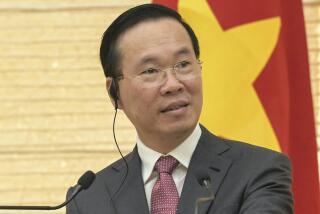China Names Li Peng, 59, as Its Acting Premier
- Share via
BEIJING — Vice Premier Li Peng was named China’s acting premier Tuesday, replacing General Secretary Zhao Ziyang, who has held the post since 1980 but resigned it to concentrate on his duties as Communist Party chief.
Li, 59, a Soviet-trained engineer, is generally viewed as more cautious than Zhao about some market-oriented reforms now being promoted by China’s leaders. But like others in China’s top leadership, Li is committed to modernization and the use of some market mechanisms to achieve his goal.
The official New China News Agency reported Tuesday that the 130-member Standing Committee of the National People’s Congress, which is China’s Parliament, has approved Zhao’s resignation and accepted “his proposal for appointing Li Peng as acting premier.”
The news agency described Li as “knowledgeable of modern management and administration.”
“Li Peng was praised as a qualified choice for acting premier by China’s Parliament members, and his appointment was viewed as helpful to China’s reforms and open policy,” the agency added.
The full National People’s Congress is expected to confirm the appointment when it meets in March or thereabouts.
For several years, Li, the adopted son of the late Premier Chou En-lai, had been viewed as the leading contender for the post whenever Zhao, 68, vacated it to take up the more important post of party general secretary. This expectation became even stronger after China’s leaders held their annual working vacation last August in the seaside Beidaihe resort.
Promotion of Li to the position of premier is widely seen as part of an agreement worked out in August between reformers centered on paramount leader Deng Xiaoping, 83, and more orthodox elderly leaders worried about the scope and pace of some reforms.
Chen Protege
Li is also considered a protege of Chen Yun, 82, the ailing central planner who stepped down from the Politburo at a party congress that concluded early this month. Chen has been the most powerful critic of some of the market-oriented reforms advocated by Deng and Zhao. Thus, Li is often viewed as a member of the so-called “conservative” wing of the party, which leans toward central economic and ideological control.
But Li himself disputes this.
“The allegation that I am in favor of a centrally planned economy is totally a misunderstanding,” Li told foreign reporters at a Nov. 2 reception immediately after he was named one of the five members of the Politburo Standing Committee, the Communist Party’s top policy-making body. “The economic system must be restructured.”
Li has also been viewed by some analysts as more favorably inclined toward the Soviet Union than many other top Chinese leaders. Asked at a press conference in March whether he would like China to adopt a foreign policy more friendly to the Soviet Union, Li replied: “I can tell you very earnestly that I am a member of the Chinese Communist Party and a member of the Chinese government. I would faithfully implement the policy of the party and of the government.”
The full 17-member Politburo is strongly dominated by advocates of market-oriented reforms. Also, the recent party congress approved a report by Zhao that endorsed use of techniques more commonly associated with capitalism, including issuance of stocks and bonds, and the use of market mechanisms to allocate financial, technical, labor and other resources.
This means that as acting premier--and presumably eventually as premier--Li’s job will be to enact a reformist program. Li said at the Nov. 2 reception that he helped draft the report delivered by Zhao, that he voted in favor of it and that he would “forcefully” carry it out.
The more radical reformers in China’s leadership appear more willing than Li to push such politically risky policies as bankruptcy of unprofitable state enterprises and price reform. They see these as vital steps toward rationalization of China’s economy, despite the threat to workers’ job security and the inflation likely to accompany further elimination of subsidies and price controls.
But the basic reform program endorsed by the party congress calls for creation of a system in which “the state regulates the market, and the market guides enterprises.”
Li appears to be comfortable with such a program.
Studied in Moscow
The New China News Agency reported that in a speech after his appointment, Li “said he would adhere to . . . the policy of carrying out various reforms and opening to the outside world, while continuing to maintain the political situation of stability and unity, and pursue, as always, the country’s independent foreign policy, and do his best to accelerate the country’s modernization drive.”
Li brings to his new job credentials as a technocrat and economic bureaucrat. From 1948 to 1954, Li studied hydro-power engineering in Moscow. After returning to Beijing in 1955, he spent three decades as a government official specializing in power and energy resources. He was named a vice premier in 1983. Two years later he was elected to the Politburo, and also was named the minister in charge of the state education commission.
Li visited the United States in 1985 as the No. 2 person in a delegation headed by President Li Xiannian, 78. On that trip, he impressed American officials with his grasp of detail on various technical issues.
A State Department official was reported to have described him as a “very sharp, very articulate guy who has the tendency to go right to the heart of the issue.”
In his speech Tuesday, according to the New China News Agency, Li declared: “A lot of things are waiting to be done, and the tasks facing us are not easy. We should tackle them in a bold, prudent and earnest way.”
More to Read
Sign up for Essential California
The most important California stories and recommendations in your inbox every morning.
You may occasionally receive promotional content from the Los Angeles Times.













